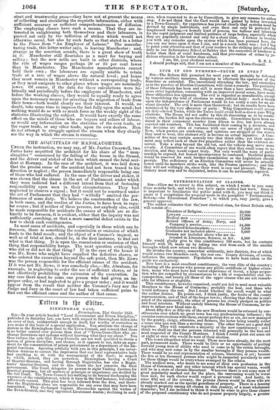THE ACQUITTALS OF MANSLAUGHTER
UNDER the instruction, we may say, of Mr. Justice Cresswell, two Juries have acquitted the architect for his share of the " man- slaughter " occasioned by the falling of the house in the Strand, and the driver and stoker of the train which caused the fatal acci- dent at Hornsey. In the ease of the architect, it was laid down that the precise cause of the accident had not been traced to his direction or neglect ; the person immediately responsible being one of those who had suffered. In the ease of the driver and stoker, it was shown that the clause in the act of Parliament under which they were indicted had a different intent from that of fastening responsibility upon men in their circumstances. They had neglected to observe a signal ; but it could not be construed. under the act of Parliament that they had " wilfully" omitted the per- formance of some duty. We believe the construction of the law, in both eases and the verdict of the Juries, to have been in regu- lar course ; lint if neither of these persons, nor anybody else, could be made responsible for accidents the causes of which are so dis- tinctly to be foreseen, it is evident, either that the inquiry was not sufficiently searching, or that a more essential defect exists in the law to check such contingencies.
In most cases of accidents, and especially in those which can be foreseen' there is something the commission or omission of which leads to the fatal result; and the object of a Coroner's inquest, as well as of trial at law, should be, in the first instance, to find out what is that thing. It is upon the commission or omission of that thing that responsibility hangs. The next question evidently is, who did or did not do that thing ? If in the case of the house it was Mr. Rowe who might have supplied the defective shores, or who ordered the excavation beyond the safe point, then Mr. Rowe was the person responsible for the efficient causes of the accident. If it was not Mr. Rowe, it was somebody else —Mr. Abraham, for example, in neglecting to order the use of sufficient shores, or in not effectively prohibiting the extension of the excavation. In any case there must be some one person who had given an im- proper order, or had neglected to give a proper order ; and it would appear from the result that neither the Coroner's Jury nor the Judge and Jury in the court of law had taken sufficient pains to find out the efficient cause and the author of that cause.


























 Previous page
Previous page